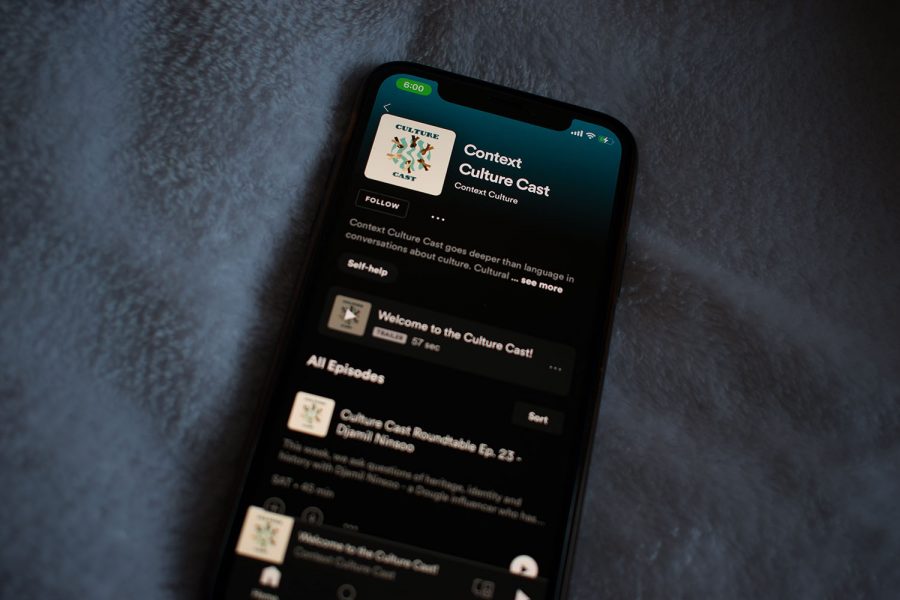Context Culture: Current and former Hawkeyes developing new app and platform
The application and podcast are dedicated to helping people navigate cross-cultural communication in various situations, including study abroad, international education, business, and backpacking.
April 25, 2021
Three students who met at the University of Iowa just before the pandemic are developing an app called Context Culture, dedicated to story-based cross-cultural communications and learning.
In the Iowa Startup Games, an entrepreneurial competition with the Tippie College of Business, Stewart Knights, co-founder of Context Culture and former U.K. exchange student to the UI, decided to pitch the concept of stories that are interactive that put you in the context of a situation you are likely to face.
This is what would become Context Culture, Knights said.
It was during the games that Knights met Jude Aboagye, now a co-founder of Context Culture. Through International Programs’ Engaging Across Culture program, Knights met Yuchen Liu, the platform’s content developer.
The rest was history, Knights said.
“I think the overarching goal is to lift the baseline of cross-cultural competence,” Knights said. “So, we want to make sure that the average person is more educated than last year, on just general culture, and cultural understanding, cultural appreciation.”
Knights said the mission behind the platform began for him during a monthlong volunteer trip to Fiji.
Knights said in preparation for his trip, aside from a short workshop, he was given a list of do’s and don’ts before being thrown into a classroom to teach elementary aged students.
“Out of nowhere, one of the kids runs up to me, and just gave me this hug,” Knights said. “I just didn’t know how to reciprocate an emotion like that. So, I’m trying to figure out whether that was on the do’s or don’ts list and obviously it isn’t. So, I’m thinking like, ‘what do I do here?’”
Knights ended up ruffling the hair of the child — a normal gesture in the U.K., but in Fiji, the head is the connection between the child and God, a connection never allowed to be disrupted.
It’s one of the worst things someone can do, Knights said.
“Then after that, I was kind of paranoid and I didn’t want to step out of line or do anything stupid again,” Knights said. “So, I wasn’t a good volunteer, I would say. I think I was just too cautious, unable to relax and be flexible.”
Transitioning to life in Iowa as an exchange student for the 2019-2020 school year, Knights said he continued to feel a culture disconnect, which he wasn’t expecting, initially thinking the culture would be the same as in the U.K.
“I just struggled to figure out how to act in a way that kind of made sense, if that makes sense,” Knights said. “I think what happened was I became this stereotypical British person, you know, top hat, cup of tea. I sort of played into those tropes just because it was easy then to build from there.”
As the app developed, Knights has worked on expanding the team through different connections he has made from other of his other contacts, he said. Coordinating with different time zones and getting stuff done can be tough, Knights said, but because the team shares a common goal of cross-cultural competence, it makes things easier.
He said the team does not have a concrete timeframe from Apple for when the app will be released, but they are hoping it is within the next few weeks.
RELATED: Students form organization to bring Caribbean and South American students together
Liu, a Ph.D. student in the UI Foreign Language and English as a Second Language education program, said after meeting Knights, the group began work on the application, which is nonprofit and research based, Liu said.
“We called it Context Culture because it’s really story based,” Liu said. “So, we wanted the culture stories, really authentic stories – and then let people tell their stories, so it’s more like a storytelling-based website.”
Liu said the app’s purpose is to help people embrace cultural differences, to shift from polarization to adaptation — a pillar of intercultural competency.
The application’s interface is separated into different segments for different target audiences, ranging from international students to backpackers to business professionals, Liu said.
Users learn through stories based on the categories they select, Liu said, so if someone is an international student looking for tips before going to the U.S. to mitigate culture shock, the app will take them through different scenarios.
Scenarios include aspects of punctuality, gestures, and greetings, Liu said, she hopes to use the intercultural development index to assess whether people’s cultural competency improves from using the app.
“Because I’m Chinese, I know the Chinese culture mainly, but we finished all of the Chinese stories in different categories,” Liu said. “We are collecting more storytellers, volunteers who want to share their stories so we can do different cultures, so they are really diverse.”
Liu said she thinks there is an unlimited source for stories, because everyone has their own cultural background.
The group also works on a podcast called the Context Culture Cast, which is a round table style discussion on one specific cultural phenomenon.
“Like, for example, people ask me why Asian people eat rice all the time, which is not true, it’s more like a stereotype. We eat bread too; we eat different kinds of things. So, we want to use this platform to break down those stereotypes,” Liu said. “Really let people hear, know, or understand the different cultural differences.
Liu and Knights record the podcast every week, with guests from all over the world, Liu added.
Liu said she wished there would have been a platform like Context Culture she could have used before coming to the U.S. to talk about her own stories and learn from others’.
“I feel the benefits from doing that for myself as well,” Liu said. “As a minority living in a different country with all the racial issues around, I feel like this is a platform really for myself to be heard or to be seen on … There is no single story.”
Aboagye, a UI grad and also a co-founder of Context Culture, said he has played various roles within the team since the Iowa Startup Games.
Aboagye spent the first five years of his life in Ghana, he said, and plans on contributing his own experience to the content side of things, but right now he is focused on the strategic side.
He handles big picture and moving forward ideas, new pivots, monetary information, marketing, social media, mixing audio content, and finding new people to work with.
“The idea of culture is usually tied to nationality or language,” Aboagye said. “I feel that in context, we’re trying to break that down [and] merge into the idea that culture is those things but it’s also certain things that we all share, regardless of where we might be from.”
The pandemic and lack of people traveling right now has made the team change their approach a few times, he added.
“At this point, I’m more in the global citizen type of mindset,” Aboagye said. “It’s become less educational, and more like, a holistic kind of experience.”
Right now, Aboagye said the main goal is to get the app out and have people start interacting with it and continue expanding on the culture aspect of context culture.
“The other half that’s not the educational side of it,” Aboagye said, “is getting to something that could make people connect, in addition to highlighting how culture can be different in different places.”






